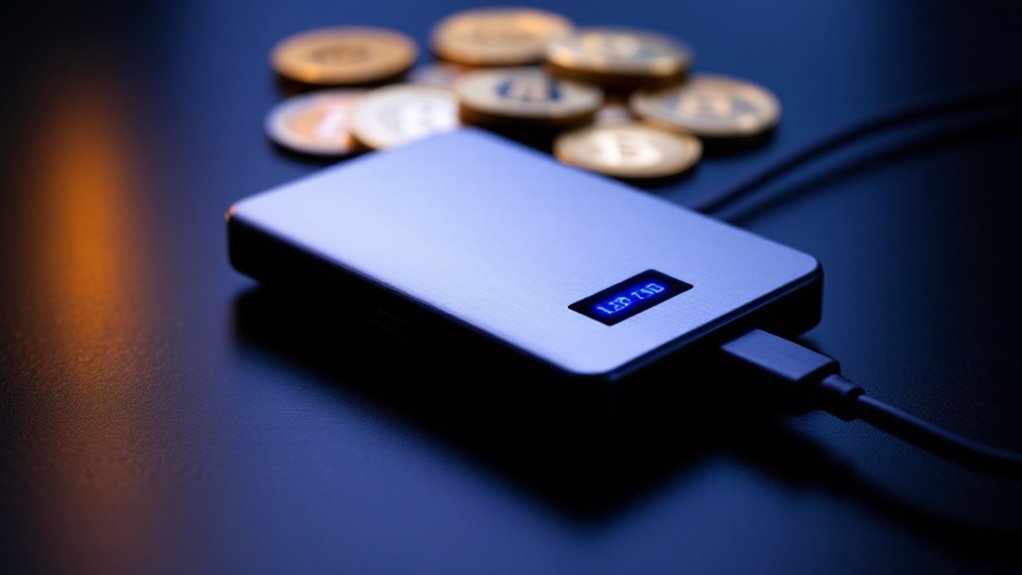A cryptocurrency wallet functions as a digital safe that stores the cryptographic keys needed to access and manage digital assets on the blockchain. Unlike traditional wallets, crypto wallets don't actually hold cryptocurrencies – they secure private keys that prove ownership and enable transactions. These wallets come in various forms, from internet-connected "hot wallets" to offline "cold storage" devices, each offering different balances of security and convenience. Understanding the key features helps users select the right wallet for their needs.

The digital revolution of cryptocurrency has made crypto wallets an essential tool for anyone venturing into the world of digital assets. These specialized digital tools serve as secure storage solutions for cryptocurrencies, managing the private keys necessary for accessing and transferring digital assets across blockchain networks.
Crypto wallets are the digital gatekeepers of the blockchain world, securing private keys and safeguarding access to cryptocurrency assets.
Think of a crypto wallet as a sophisticated digital safe – except instead of storing physical valuables, it safeguards the cryptographic keys that prove ownership of digital assets. These wallets come in various forms, each catering to different needs and security preferences. Hot wallets maintain an internet connection for convenient transactions, while cold wallets operate offline for enhanced security. It's like choosing between keeping cash in your everyday wallet versus a bank vault – each has its purpose. Users can choose between custodial services or manage their own private keys for complete control.
At the heart of every crypto wallet lies the private key, a complex string of characters that acts as the ultimate proof of ownership. This key pairs with a public key, which generates wallet addresses for receiving funds – similar to how an email address works, but with military-grade security. The wallet also includes a seed phrase, a series of words that can restore access if the wallet is lost or damaged. The evolution of wallet technology has advanced significantly since Bitcoin Core was first released as open-source software in 2009.
Modern crypto wallets incorporate various security features to protect users' assets. These include encryption, two-factor authentication, and even biometric verification. Some wallets, known as multi-signature wallets, require multiple approvals for transactions, adding an extra layer of security – like requiring both a bank manager's and account holder's signature for large withdrawals. Selecting the right wallet requires careful consideration of your risk tolerance and usage patterns.
The marketplace offers numerous wallet options, from hardware devices like Ledger and Trezor to software solutions such as MetaMask and Exodus. Web-based wallets provide convenient access through browsers, while mobile wallets offer on-the-go functionality.
For maximum security, some users opt for paper wallets, which store keys completely offline in printed form. The choice of wallet typically depends on factors like intended use, security requirements, and the types of cryptocurrencies being stored.
Frequently Asked Questions
Can I Recover My Crypto Wallet if My Device Is Stolen?
Yes, crypto wallets can be recovered if a device is stolen, provided proper security measures were taken beforehand.
The wallet can be restored using the seed phrase (a series of recovery words) on a new device. Users should immediately contact their wallet provider, change passwords, and monitor for unauthorized transactions.
Using encrypted backups, hardware wallets, and enabling two-factor authentication adds extra layers of protection against theft.
What Happens to My Crypto if the Wallet Provider Goes Bankrupt?
The impact of a wallet provider's bankruptcy depends on whether it's a custodial or non-custodial wallet.
With custodial wallets, where the provider holds the private keys, users' crypto may become part of bankruptcy proceedings and could face access restrictions or partial losses.
However, non-custodial wallets, where users control their private keys, remain unaffected by the provider's bankruptcy since the assets are stored independently on the blockchain.
Are Hardware Wallets Worth the Investment for Small Cryptocurrency Amounts?
For small cryptocurrency amounts, hardware wallets may not be the most cost-effective solution.
While these devices offer superior security, their initial investment ($50-$200) could represent a significant percentage of modest holdings.
A general rule suggests considering hardware wallets when crypto assets exceed $1,000.
For smaller amounts, properly secured software wallets with strong passwords and two-factor authentication can provide adequate protection while users build their portfolio.
Can I Share My Wallet Address Publicly Without Security Risks?
Sharing a public wallet address is generally safe for receiving funds, similar to sharing an email address.
However, it does expose transaction history and balances to anyone who looks up the address. While the address alone cannot be used to access funds, it may increase exposure to phishing attempts or unwanted attention.
Using new addresses for different transactions and verifying addresses carefully helps maintain better privacy and security.
How Often Should I Update My Crypto Wallet Software?
Crypto wallet software should be updated at least monthly to maintain security and functionality.
Critical security patches require immediate updates when released. The best practice is enabling automatic updates while manually checking the wallet provider's official channels for important notifications.
Like maintaining a car, regular wallet updates help prevent issues by patching vulnerabilities, improving performance, and ensuring compatibility with blockchain protocol changes.










43 comments